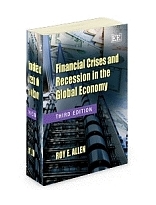In this newly revised and updated edition, Roy E. Allen documents and
explains major financial instabilities and trends across the global economy since the
1970s, including the crisis that began in 2008 and the long boom preceding it.
The author expands our understanding of the most recent crisis using evolutionary and
complex systems approaches, particularly ones that privilege the role of interactive
knowledge and belief systems. Various large-scale economic crises are shown to be driven
more by psychological and social constructs than is commonly understood. In both boom and
bust, financial markets absorb money away from GDP uses; capital and wealth can be
created, transferred, and destroyed across time and space more powerfully and
independently of GDP processes than is generally thought. The author also advances our
understanding of the free-trade versus mercantilism debate by showing that the US economy
has benefited from what he calls ‘money-mercantilism’ at the expense of other regions
of the world.
This learned yet accessible book will be of great value to a wide range of scholars,
practitioners, policymakers, and interested observers of the global economy.
Roy E. Allen, Professor of Economics, School of Economics and Business
Administration, Saint Mary’s College of California, US
Table of Contents
1 Financial globalization since the 1970s 1
2 Financial instabilities and trends in the 1980s 35
3 Financial instabilities and trends in the 1990s 87
4 The current crisis : common patterns and new thinking 111
5 Toward a new political economy of financial crisis 133
References 161
Index 169
192 pages, Paperback
Księgarnia nie działa. Nie odpowiadamy na pytania i nie realizujemy zamówien. Do odwolania !.


